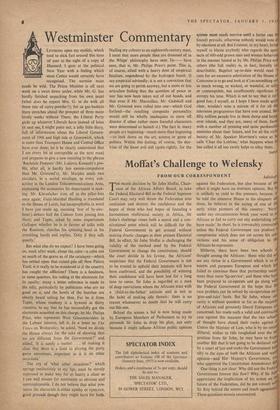Westminster Commentary
But what else do we expect? I have been going on, week after week, about the calm—a calm not so much of the grave as of the catalepsy—which has settled upon that ruined pile off New Palace Yard; is it really to be wondered at if the country has caught the affliction? There is a fondness, in some quarters, for railing at the electorate for its apathy; many a bitter reference is made to the telly, particularly by politicians who are no good on it, and the howls of the banshee are clearly heard tolling for thee. Far be it from Taper, whose modesty is a byword in thirty counties, to say that he has successfully got the electorate acquitted on this charge; let Mr. Philips Price, who represents West Gloucestershire in the Labour interest, tell it. In a letter to The Times on Wednesday, he asked, 'Need we divide the House always for the sake of showing that we are different from the Government?' and added, 'It is surely a matter . . . of making it clear that there is a limit to playing the party game sometimes, important as it is on other occasions.'
The cry of 'what other occasions?' which springs instinctively to my lips, must be sternly repressed to make way for as hearty a cheer as I can well muster for sentiments so obvious and unexceptionable. I do not believe that what pos- sesses the electorate is either apathy or cynicism, good grounds though they might have for both. Nailing my colours to an eighteenth-century mast, I insist that more people than are dreamed of in the Whips' philosophy have seen Ta— have seen, that is, Mr. Philips Price's point. This is, of course, allied with a heavy dose of empirical fatalism, engendered by the hydrogen bomb. (I say empirical advisedly; it is not a conviction that we are going to perish anyway, but a more or less articulate feeling that the question of peace or war has now been taken out of our hands, and that even if Mr. Macmillan, Mr. Gaitskell and Mr. Grimond were rolled into one—which God forfend—the resulting composite personality would still be wholly inadequate to stave off disaster if other rather more forceful characters were determined to launch it.) The fact is, many people are beginning—much more than beginning —to look down on the art, science or game of politics. Within this feeling, of course, the doc- trine of the lesser evil still (quite.. rightly, for the system must needs survive until a better can be found) prevails, otherwise nobody would vote at by-elections at all. But I cannot, in my heart, bring myself to blame anybody who regards the spec' tacle of 600-odd grown men and women behaving in the manner hinted at by Mr. Philips Price and others (the full reality is, in fact, literally in. describable; Bagehot up-to-date would read '3 cure for an excessive admiration of the House of Commons is to go and look at it') as something not so much wrong, or wicked, or wasteful, or silly' or contemptible, but insufficiently significant 10 occupy his time. Which is not to say that it isn't good fun; I myself, as I hope I have made quite clear, wouldn't miss a minute of it for all the television programmes that have ever existed. BO fifty million people live in these damp and hunt over islands, and they are, many of them, faced with a number of pressing and quite pardonable anxieties about their future, and for all the virile beauty of Mr. Speaker Morrison's voice as he calls 'Clear the Lobbies,' what happens when he has called it all too rarely helps to allay them.
TA










































 Previous page
Previous page